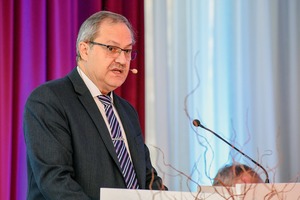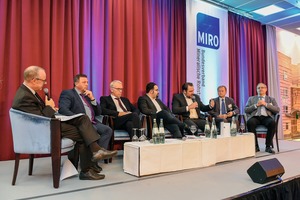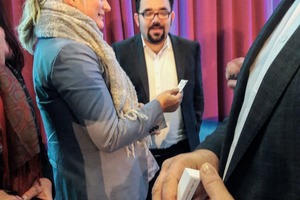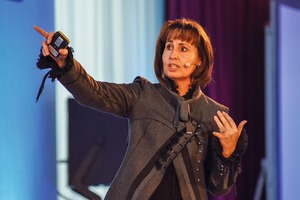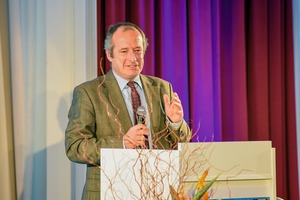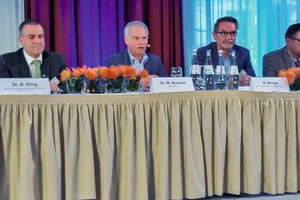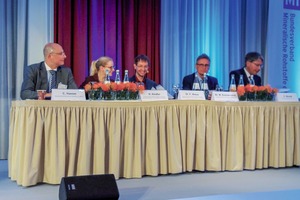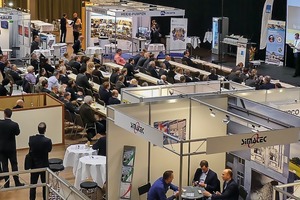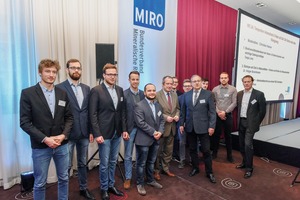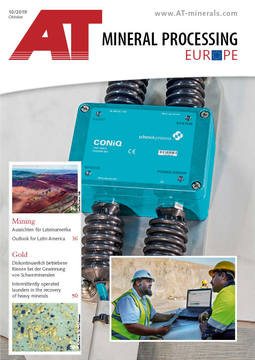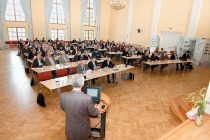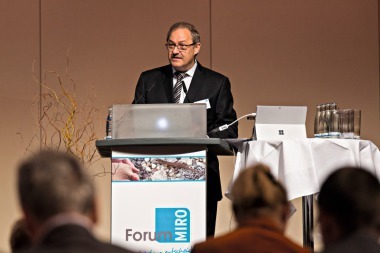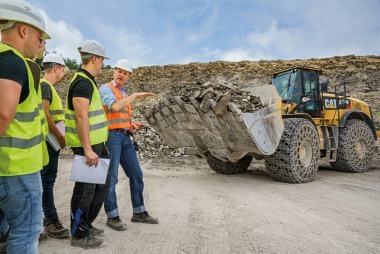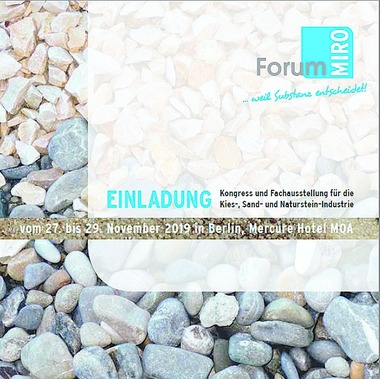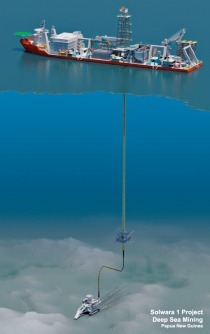ForumMIRO 2018 – Congress and technical exhibition for the gravel, sand and stone industry
Panel discussion
The ForumMIRO commenced on the eve of the congress with a political kick-off on the subject of “Living space, jobs, mobility – none of these are possible without building resources”. The question was thus posed of why mineral resources are effectively universally present in Germany, but are nonetheless rare. This topic was discussed under the chairmanship of journalist Tom Hegermann, of Haan, by the following:
Dr. Gerd Hagenhuth, President, Federal Mineral Resources Association
Dr. Volker Steinbach, Vice-President of the Federal Institute for Geosciences and Natural Resources
Volkmar Vogel, MGP[1], Deputy Chairman of the Building, Housing, Urban Development and Municipalities workgroup of the parliamentary CDU/CSU
Bernhard Daldrup, MGP, spokesman for the Building, Housing, Urban Development and Municipalities workgroup of the parliamentary SPD
Daniel Föst, MGP, spokesman of the Building and Housing Policy workgroup of the parliamentary FDP
Chris Kühn, MGP, spokesman of the Building and Housing Policy workgroup of the parliamentary Bündnis 90/Die Grünen (Greens) party
“Shaping the future means building something, designing something, making reality of ideas – and for this, we need building materials”. These were the words with which Tom Hegermann initiated the political discussion. He asked the discussion participants: “How important is building for our future, how important is the industry, and how important are mineral resources?”. Despite differing views on many details, and on regulatory instruments and their implementation, in particular, there was unanimity on at least one thing: Germany needs mineral resources. Around 570 million t of primary and secondary building resource materials have to be extracted every year in order to meet the needs of approved construction projects.
Moderate tones were audible, from, for example, MGP Vogel, who, in addition to the need for the effective utilisation of primary and secondary, and the extraction of sustainable, building resources, also regarded as indispensable dependable political decisions, not least of all in view of the long planning periods for primary extractive companies.
MGP Daldrup emphasised that “The assuredness of supply and the extraction of mineral resources are of monumental importance – in conjunction, too, with planned municipal housing construction”, but that the boundary conditions must also harmonise with the conservation of nature and the environment. He also gave expression to the danger emanating from China: threats to jobs and locations; the resources markets have been internationalised and there is a need to develop a counter-strategy.
MGP Föst and MGP Kühn also expressed their commitment to the extraction of domestic mineral resources, but stressed as well the need to include the protection of nature and the climate. They were critical of the fact that implementation and downstream costs are taken far too little into account in the enactment of new regulations.
Dr. Hagenhuth found unequivocal words in iterating the industry’s demands to the politicians:
Pre-emptive assurance of supplies of mineral resources
Accelerated approval procedures
Reinforcement of technical expertise
Practice continues to demonstrate that conflicts of utilisation are increasing, despite the fact that the conservation of nature and popular acceptance are being taken into account in the opening of a new primary extractive operation and that biotopes of a high level of biodiversity are being developed. This speaker cited drastic examples to illustrate the negative effects of distrust on the part of the politicians and the populace: the “Lower Rhine Initiative for Future”, for example – of twenty-seven firms, eleven will close during the next five years, signifying the loss of 5 million t/a of sand and gravel, and a deficit of around 10 % of building resources for the state of NRW. Or: no bid could be submitted against an enquiry for a highway-construction project in Bremen, because the necessary mineral resources were lacking. His plea to the politicians and administrators: planning certainty, rapid processing of planning projects and assistance in achieving acceptance by the population, in the form of favourable public-relations work. He emphasised, in response, that the industry is prepared to tread new paths.
The chairperson’s closing question was: “What do you wish for the industry, and/or what do you wish from the industry”:
MGP Vogel: Good sales figures, and acceptable profit levels/continued consideration of endangered assets, optimised extraction
MGP Daldrup greeted these words, adding good employees/efforts to further future-viable primary and secondary mineral resources
MGP Kühn: The industry should participate vociferously in the political discussion/develop innovative solutions
MGP Vöst: A plea for endurance, because the smaller companies are also needed/“black sheep” (environmental “sinners”) should be publicly shamed
Dr. Steinbach: May the industry continue to supply mineral resources/resources-efficiency should be allocated top priority
Dr. Hagenhuth: His wishes were not addressed to the industry, but rather to the politicians. “Around 300 companies are monitoring the discussion. Our wish is that you, as influencers in the German Parliament, publicise the needs of the industry. It is important to remain in dialogue and to evolve even better concepts for afteruse.”
Plenary event
President Dr. Hagenhuth opened the ForumMIRO 2018 with a short speech of welcome. He firstly expressed the opinion that it was a good idea to open an association office in Berlin, in order to be “immediately in touch with top-level politics”. In addition to keynote speaker Prof. Dr. Jutta Rump and Thilo Juchem, newly elected President of the European Aggregates Association (UEPG), Dr. Hagenhuth addressed, in particular, students from the RWTH Aachen University, the TU Bergakademie Freiberg University of Resources and the Ludwigsburg University of Applied Sciences, as potential future industry employees. “Pursuing new paths, and acting instead of sitting on the sidelines, unequivocal decisions and legal certainty for the companies, access to domestic mineral resources, but absolutely no resources royalty” – these are the demands of the MIRO association. The new edition of the mineral-resources strategy must be questioned, and new mineral resources welcomed, but equality of treatment is an absolute necessity, while the complication of developing sites caused by protracted approval procedures causes significant disadvantages to the national economy. “This forum is the platform for the industry to pursue these new paths”, Dr. Hagenhuth concluded, and then transited to the industry film “1 kg minerals per hour” by Søren Eiko Mielke (director) and Susanne Funke (MIRO), a joint project by MIRO and the state associations which informs citizens in an informal manner on the importance of mineral resources in our daily lives (“from the baptismal font to the memorial stone”) and is to be entered in the competition for the German Industrial Film Award.
In her keynote speech, Prof. Dr. Jutta Rump, of Ludwigshafen University of Applied Sciences, and also director of the Institute for Employment and Employability, Ludwigshafen, examined the labour market, the scarcity of labour (young recruits and skilled workers) and its causes (demography, technical, economic and social developments) in as much detail as the conservation of employability, the reconcilability of work and family, the work-life balance and initial and further training (strengths and personality orientated deployment of employees). She selected numerous examples to illustrate, in a spirited paper, today’s changed working world and its consequences.
Speech from the federal economics ministry
The speech from the Federal Ministry for Economic Affairs and Energy (BMWi) was awaited with great anticipation. Federal minister Peter Altmaier was originally due to speak, but actually attending was Parliamentary Secretary of State Oliver Wittke, who was welcomed by Dr. Hagenhuth, who again emphatically drew attention during his preamble and introduction to the needs and anxieties of the industry and urgently pointed out to the Secretary of State that dependable political partners are needed, at both federal and federal-state level, and that, conversely, a general resources royalty is to be rejected.
Secretary of State Wittke had many words of praise for the industry, underlined its adherence to the high environmental standards set and promised that the BMWi would continue to advocate for the industry because: “We need mineral resources Made in Germany”! The continuation of the resources-efficiency programme (ProgRess III) is also intended to serve this purpose. The speaker stressed that local production is necessary as part of good climate policy; this means, therefore, decentralised extraction and supply – entirely in line with the companies’ wishes and interests. Dr. Hagenhuth thanked Secretary of State Wittke for his clear concordance with the association’s aspirations and for his unequivocal commitment to the industry.
Workshops
The afternoon of the first day of the conference and the whole second day were reserved for the following workshops which, with certain exceptions, can be examined within the scope of this report only on a global basis.
The (mineral-resources) country needs sites
Chairperson Dr. Bernhard Kling, of the Bavarian Minerals and Aggregates Association, Munich, ascertained by way of introduction that the industry could, in fact, be pleased, in view of the large quantities of mineral resources needed – but availability is poor! There is a lack of adequate sites to meet needs. The large number of exclusion zones means that availability will be questionable in 20 to 30 years. A study performed by the association also indicates that demand will not fall in the longer term. What, therefore, is to be done in order to assure –and approve – needs-orientated utilisation of the deposits in the future? There are various views on this:
In his address entitled “The resources turnaround 2049 – solving Germany’s resources dilemma”, Dr. Matthias Burchert, of the Öko-Institut for Applied Ecology, Darmstadt, forecast that the difficulties and conflicts in expanding existing and developing new sites would grow if there is no paradigm shift. He reminded the attendees that, in 2017, supply shortages of building resources occurred for the first time in the Ruhr region and that a worsening of supply difficulties is also predicted for 2019. So what is to be done? In this speaker’s opinion, there is no alternative to reductions in the demand pressure exerted on the natural deposits.
There is no patent short-term remedy. The speaker did, however, see the following possibilities for the mid- and long term:
Quality instead of quantity: assign, tendentially, a higher ranking and a higher price to tonnage mineral resources! Enduring signals generated by prices would counteract waste and inefficient use, and make high-quality recycling more attractive.
Significant increases in the useful life of the end products (buildings, etc.) and, in some cases, modified building methods.
Uprating of approved production sites and defusing of utilisation conflicts
The overall conclusion: The key can be found in a tendential (mid- and long-term) reduction in annual mineral-resources production, and in methods of compensating for this. These remarks evoked pronounced opposition: Thoughts about our market economy – Demand should set prices in a market economy – Demand is not aroused, but instead met!
“Going my way? Yes/no/maybe – Industry asks politicians” – the very title of the paper by Raimo Benger, of vero – Construction and Mineral Resources Association, Duisburg, indicated the wishes of the companies in question to continue obtaining their mineral resources. This speaker also mentioned as problematical, in terms of site availability, inter alia, the afteruse of mineral-resources sites, concentration-zone planning and exaggerated demands for compensation, and as potential solutions, among other things, the relinquishment of universal planning of compensation sites, site interchange, the creation of resources-assurance maps, mineral-resources reports, and the obligatory designation of reserved zones. He criticised the high obstacles set by federal and European law, and also the escalating periods taken up by approval procedures. In this field, only procedure simplification packages can provide a remedy, but: communication is just as indispensable as public-relations work. The target should be a frank and transparent interchange between companies, authorities, the environmental associations, and the unions. His credo: We do not have a scarcity of mineral resources, what we have is a scarcity of approvals.
Christian Wild, of F.L. Juchem & Söhne GmbH & Co. KG, Niederwörresbach, reported on a pilot project – Sustainable Assurance of Mineral Resources Concept Rhine-Nahe – which was conducted between 2013 and 2015. Some 56 approved and 89 potential mineral-resources sites were assessed in outline. This resulted in the stipulation of priority zones for the extraction of mineral resources, the securement of exploitable mineral resources, and zones for assuredness of mineral-resources supply. Here, Dr. Kling warned against excessively detailed planning from the inception, which could hinder the realistic meeting of demand.
Resources Extraction 4.0: Potentials and limitations
of digitalisation
Digitalisation has long ago arrived in the minerals industry, too. Quantities of operating data are acquired and evaluated by means of integrated software packages, and networks are created. But are there in the minerals industry, which is frequently required to achieve defined products from undefined feed materials of fluctuating quality, also natural limits attaching to the high target of Resources Extraction 4.0?
This fascinating question was discussed by three speakers under the chairmanship of Dr. Marc Dohmen, of Dohmen, Herzog & Partner GmbH, Aachen:
André Bauhaus, of Holemans GmbH, Rees: Big Data: The status quo in acquisition of operating data
Sören Schramm, of Trimble Germany GmbH, Raunheim: How do related industries do it?
Sebastian-Friedrich Kowitz, talpasolutions GmbH, Essen: smartQuarry – Networked acquisition and analysis of operating data for quarries and gravel works
Greater acceptance of resources extraction – what can be done?
This topic had already been raised on the evening prior to the conference and in the MIRO president’s opening speech, and the importance of these problems for the industry also found expression in the three following papers, which essentially examined the question of what methods can be applied in order to counter majority opinion directed against resources extraction projects.
Hannah Kindler and Dr. Florian Weber, of the Eberhard Karls University of Tübingen, thus discussed a guideline containing recommendations for action derived from the surveying of households and citizens’ initiatives. Dipl.-Psych. Dr. Michael Kossakowski examined the topic of “framing”, i.e., the imposition of the “correct” framework of interpretation as a means for influencing perception and action, and illustrated how the right frames can evoke positive perceptions. Finally, Attorney Christian Strunk, who can look back on fifteen years of work as the mayor of the town of Xanten, reported on the tense environment in which local councils and politicians find themselves and how it can nonetheless be possible to bring extraction projects to fruition by mutual consent. Here, he noted, acceptance of responsibility is a decisive factor.
Other workshops
Recruiting future staff made easy
Here, the ways of recruiting future staff, the expectations of young managerial staff on “their” company, and questions of industry-specific opportunities for further training were the focus of discussion.
Temporary protection of species and “nature only for a while”: The search for the ideal solution
Three papers on this important subject examined in detail the mineral resources industry’s biodiversity data-base, discussed biotopes in mines and quarries, with their potentials and risks for the operators, and provided information on a workshop report entitled “Nature only for a while” from an R&D project.
Data-transmission as a basis for Resources Extraction 4.0
What is the picture for digitalised future technology in Germany – particularly in rural areas? What can be done without sufficient network availability, what is to be done to achieve high-efficiency data transmission using high-range WLAN and locating, instead of USB sticks and note pads? Questions to which two papers were devoted.
Approvals now
Given the already difficult situation with approvals, the industry must again reckon with additional packages of demands. The reason being the ongoing evaluation of the European Framework Water Directive (WRRL), as was shown by Dr. Christoph Gerstgraser, of the gerstgraser – Ingenieurbüro für Renaturierung engineering consultancy, Cottbus. And site utilisation documents in cases of new site development and expansion of existing ones, in addition to the new BKRI Framework Agreement on the Prevention of Water Pollution, also do not make life in the industry any easier.
Automated extraction and preparation
Data throughput from extraction to the finished product, perhaps even further-processing and integration, is the fundamental idea to which the speakers in this series of technical papers devoted their attentions: Dr. Hans Schuller, of Schlüter Baumaschinen GmbH, Erwitte (driverless operation of earthmoving machinery), along with Franz Kissling, eMining AG Heimberg, Switzerland (Electromobility in quarries) and Frank Bartsch, of the GICON – Großmann Ingenieur Consult engineering consultancy, Dresden (Digitalisation and facility management in preparation).
Technical exhibition – Hands-on innovations
The wide-ranging technical exhibition accompanying the conference provided the participants at the Forum with a further opportunity of gaining information, viewing new arrivals on the market and talking to the exhibitors of the winning, conveying and preparation technology on show. Among these exhibitors were such renowned companies as binder + co Aktiengesellschaft, of Gleisdorf, Austria; Kiesel GmbH, of Baienfurt; Liebherr-Mining Equipment Colmar SAS, Colmar, France; and Metso Germany GmbH, Düsseldorf. Smaller companies, associations, publishers and consultancies were also on hand to provide information to conference visitors.
Summary
A positive balance can again be drawn for the 9th ForumMIRO, including the general meeting of members and the technical exhibition. A particularly important role was played this year by issues of assuredness of mineral-resources supply, the acceleration of approval procedures, acceptance and legal certainty, matters which can be solved only together with politics at federal and federal-state level. Clear and unmistakable demands in response to the topics mentioned were formulated by the association, and were also reflected in many of the papers and discussion comments, and particularly during the panel discussion, and were received by the representative of the federal government with a positive echo. This gives the industry grounds to hope that something will change, since the domestic mineral resources are there, are needed, and should be made available to the industry on the basis of the sustainability strategy already in practice. It is essential that, in this context, Industry 4.0 must also take its place in the minerals industry. For this, however, preconditions must be created which, for their part, are not solely the responsibility of the building-materials industry/industry at large.
Adequate breaks and a top-rank evening event held in Berlin’s Arminius-Markthalle provided plenty of opportunity for technical discussions and for the interchange of opinion and experience.
The next ForumMIRO will take place at the Mercure Hotel MOA in Berlin on 27 – 29 November 2019.
Autor/Author: Dr. Brigitte Hoffmann, Consulting, Kreislaufwirtschaft/Umweltschutz Oberschöna/Germany

